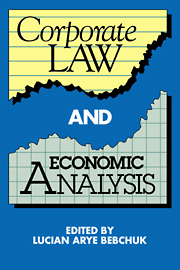Book contents
- Frontmatter
- Contents
- List of contributors
- Introduction
- Acknowledgments
- 1 Mergers, acquisitions, and leveraged buyouts: an efficiency assessment
- 2 Discounted share prices as a source of acquisition gains
- 3 Ties that bond: dual class common stock and the problem of shareholder choice
- 4 Property rights in assets and resistance to tender offers
- 5 A new approach to corporate reorganizations
- 6 The corporate contract
- 7 The state competition debate in corporate law
- 8 The positive role of tax law in corporate and capital markets
- 9 Ownership of the firm
- Index
2 - Discounted share prices as a source of acquisition gains
Published online by Cambridge University Press: 15 December 2009
- Frontmatter
- Contents
- List of contributors
- Introduction
- Acknowledgments
- 1 Mergers, acquisitions, and leveraged buyouts: an efficiency assessment
- 2 Discounted share prices as a source of acquisition gains
- 3 Ties that bond: dual class common stock and the problem of shareholder choice
- 4 Property rights in assets and resistance to tender offers
- 5 A new approach to corporate reorganizations
- 6 The corporate contract
- 7 The state competition debate in corporate law
- 8 The positive role of tax law in corporate and capital markets
- 9 Ownership of the firm
- Index
Summary
If the Acme Oil Company has 100,000 shares of stock trading at $10 per share, no debt, and a proven oil well as its only asset, how much should an identical firm pay to acquire Acme? Businessmen might fail the quiz, but finance students would probably answer: “Not more than $1 million ($10 × 100,000), excluding synergy gains or tax savings.”
This answer echoes a common presumption in the finance literature that informed securities prices credibly estimate the underlying value of corporate assets. Firms whose share prices fall below the market value of their assets – for example, many closed-end investment funds, holding companies, or natural resource firms – are frequently tagged as anomalies on the force of this view. But these “anomalous” firms happen to be the only firms whose asset values are readily visible. Here, then, is the rub: The direct evidence, as far as it goes, is more consistent with the conjecture that securities prices often “discount” – or underprice – expected cash flows from corporate assets than with the standard presumption that share prices fully value these assets. If discounts are widespread, however, they may have significant consequences for many areas of corporate behavior, including, above all, acquisitions behavior and the takeover market.
As the Acme hypothetical suggests, the standard presumption that share prices fully value corporate assets carries a basic implication for acquisition premia.
- Type
- Chapter
- Information
- Corporate Law and Economic Analysis , pp. 29 - 73Publisher: Cambridge University PressPrint publication year: 1990
- 1
- Cited by



